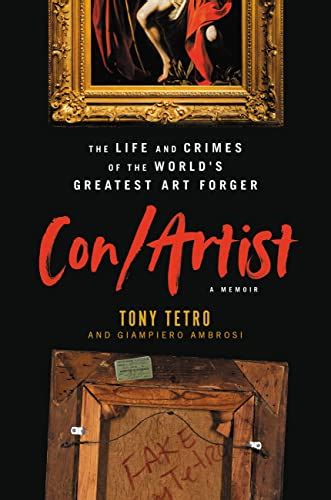Painting For Cash Numbers
Who doesn’t love a good art forgery story? It’s an intriguing mixture of high-end culture and old-time deception. Do we root for the forger? The artist? The police and investigators, charged with insuring the integrity of what must be an extremely messy business?
These and other questions came to mind in reading Tony Tetro’s memoir, Con/Artist: The Life and Crimes of the World’s Greatest Art Forger. Was Tetro the world’s greatest? There’s absolutely no way to tell. But the boast is totally in character for Tetro. It is also what one would expect from someone who makes a living forging works of art. It is not a lifestyle for the shy or retiring, most certainly not how Tetro has lived.
Tetro is a self-taught master, a careful student of art. He showed aptitude for drawing at a very early age. Growing up in a working class family in rural New York State, his interest in art was personal – not vocational. He married at an early age after an unexpected pregnancy. He and his wife had little education or professional plans. Tetro scraped by selling furniture and trying to make ends meet. He did, though, have aspirations for something better. His first forgeries came out of financial desperation and happenstance. Tetro was surprised: he truly enjoyed the process. As forgery led to money and more forgery, Tetro put more and more effort into the dishonest work. He learned tricks and that the more time and effort he invested in his dishonest craft, the better his art work copies would become.
Sales led to more sales and soon Tetro was living the fast life: expensive cars, lots of girlfriends, gambling in Las Vegas, and doing quite a bit of partying. He made a name for himself and he spent money as fast as it came in. Halfhearted cautionary admonitions are sprinkled in the book. My reading, though, is that these are not what it’s about. Tetro loved the money, the women, and the lifestyle. Tetro does caution against drug use, which caused health concerns and damaged the quality of his work. But the rest of his excesses? Tetro is a relatively unrepentant criminal.
Tetro eventually was caught. He made the obvious mistake of copying a living artist who might see the fakes. Unsurprisingly, the artist was enraged to find forgeries. The net around Tetro was closing. Much of Con/Artist is a Goodfellows-like account of Tetro scrambling for money, trying to keep his life together, and committing crimes while doing it. The jail time turned out to be a blessing. Tetro got his life in order . He needed to slow down. Now, Tetro makes copies on spec.
Con/Artist is not insightful literature. It is, though, immediate and unvarnished. Tetro is a charming scoundrel, a man blessed with great artistic talent who found a most lucrative way to enjoy it. All that said, I most certainly would be very careful purchasing a work of art from him.
David Potash
